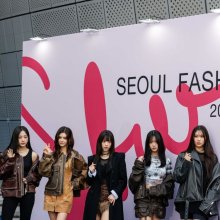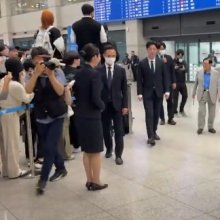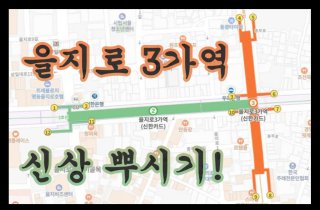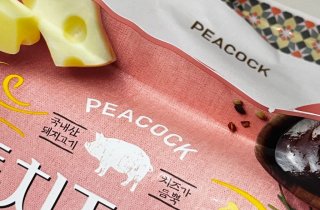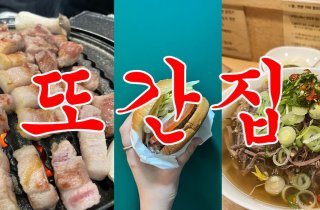Yoo Young-jin: Mr. Lee Soo-man wanted to try making a song that was a remix but would sound like one song. He suggested that we take a song he had written, write the first verse himself and bring in the second verse from one of my songs. He said if we took three significant tracks from an album, mix it together as if it were one song and perform it, then that performance would represent the entire album is about. That is how SMP first started.
10: In that sense, one could say that your songwriting method is like writing a hip-hop track. Because you were combining several different ideas onto one simple beat.
Yoo: Right. I used to love hip-hop and it is similar to how the same beat can produce completely different music depending on how the rapper does his rap. My music starts by taking a beat and fusing various ideas onto it.
Yoo: You are right. I get a lot of criticism for that too. (laugh) I am well aware that people have different opinions about my music and I always monitor their reactions. However, I believe that a cultural trend goes in a new direction when somebody creates a shock effect. Of course, when we are in the middle of that changing process, there could be some songs that sound premature or are too tipped in one particular direction that they sound other-worldly. But if we keep taking new risks, we might someday be able to come up with a shock that sounds refreshing. There are people who compose melodies that people like, but I think it's fun to have a producer like me around too. Music is becoming globalized whether you like it or not, and I want to create music that can prove to others that I have actually been doing something. When they ask us about our music, I want to be able to say proudly that it is my goal to create music for the perfect performance.
10: What do you think is necessary for Korean pop music to succeed in the Western market?
Yoo: I once asked a foreign artist to monitor one of my previous songs, but they didn't regard our R&B music as R&B. They thought of it as a new kind of Eastern music that was influenced by R&B. I am not just talking for SM here, but I think it will succeed when two things come together -- there has to be a certain uniqueness to Eastern pop music and the right artist has to perform the songs. I think that would be a refreshing culture shock to Western people.
10: These days, even SM takes foreign songs and changes it to Korean style of music. You have done that as well. What do you think is important when you do that?
Yoo: Songs like "Amigo," "Mirotic" and "Nu ABO" were written by foreign songwriters. When we decide we are going to write a certain kind of song, several songwriters including myself start doing the arrangement and write the lyrics. First of all, I don't take a song from a foreign songwriter and just use it. Their songs are incredibly simple in terms of melody, lyrics and arrangement so I add certain parts to the song that I think are necessary to succeed in Korea. Sometimes I take the sub-melody in the original composition and make it the main melody, or even make a new one from scratch. If a song has a great overall flow but a weak climax, I make it stronger. For example, [Korean girl band f(x) member] Luna's singing part in the latter part of "Nu ABO" -- that part changes the entire flow of the track. But the way it breaks the original flow and changes to a completely different vibe with a definite impact -- I think that is the style of Korean pop music.
Yoo: Of course, the sound quality is the most important thing when we are re-arranging a non-Korean song. But changing the lyrics into Korean is extremely hard too. No word sounds really good because the syllables are divided up so short. The hardest time I had with the lyrics was SHINee's "Amigo." The original song title was "Turn It Up" but all the three-syllable Korean titles we came up with sounded cheesy. So my biggest concern is to make the syllables, melody and the end note as close to the original track as I can because that is how we can keep the same rhythm. If the rhythm changes, it becomes an entirely different song.
10: For your recent songs, it seems like you are particularly keen on using words that are catchy when the rhythm or flow of the song changes.
Yoo: You are right. When you write lyrics for a dance number, you first have to stay faithful to the vibe the original track gives off. And, at the same time, you have to decide on the direction you want go with the lyrics. You can use deep metaphors with just a couple of syllables of the melody and give up the rhymes, or do the rhymes to make the song click even if lessens the impact of lyrical meaning. I like the latter method. For example, you hear the word 'mysteric' in "Nu ABO" but that word does not exist in Korean language. But if you say 'mystery," the ending sound is too weak so I changed it to 'mysteric.' In such cases, I make up new words or use ones that you can accentuate on the first syllable.
10: But there are people who criticize the lyrics of "Nu ABO" for that very reason.
Yoo: I created "Nu ABO" based entirely on impulse. I expressed what I felt at the exact moment I wrote the lyrics. Because the kids who sing "Nu ABO" are incredibly adorable yet unpredictable. For example, Sulli is a very pretty girl who sometimes does ridiculous things, and I wanted to translate her personality into words.
10: Some critics say that is why the verses don't connect and lyrics don't make sense.
Yoo: When I am trying to make the words rhyme, sometimes I extract certain words I wrote in the lyrics and use those words later in the songs. I think that is why people are saying it doesn't make sense. When I pick certain words to use, I know the overall content of the lyrics because I wrote it. But other people don't. I would like [all the words] to carry the entire meaning, but it is not easy because you can only use so many words in this style of music. This is something I have to keep working at all. I have it all organized in my head but other people tell me they don't get it. (laugh)
10: You have written lyrics that criticize society. And some people are critical of you using such lyrics for commercial music sung by idol groups.
Yoo Young-jin: There are many love songs that contain trendy words. So from the start, I was thinking that I want to try something a bit different. When TVXQ or H.O.T. sing such songs, people would enjoy their singing and dancing in the beginning but start hearing what they're actually saying after a few times, and I thought some may even become interested in what message the lyrics are delivering. I tried "O-正.反.合." because Mr. Lee Soo-man was telling me that he really hopes I use it one day when talking about changes in society. I thought that I could be able to provide somewhat of a different angle if someone looking at their performance starts taking interest in social issues he or she had not been interested in and decides to look it up on the Internet. I wasn't aiming at changing society through the songs -- I just wanted to say something through the lyrics. And I am aware of the likes and dislikes when it comes to such lyrics.
10: From the music to the stage to the lyrics, it seems like your songs try to stimulate [listeners] in every possible way.
Yoo: That's right. Because culture is a shock. Look at how the Michael Jackson's moon walk for "Billy Jean" changed [the trend for] the entire world. I too would like to create such a moment someday.
10: But I think you should control that level of shock since you make music to be sung by idol groups. What do you take into consideration when you give them songs?
Yoo: It depends on the team. With Super Junior, I think they're a team which is better to go for their mass appeal by mixing in a bit of wit into their performances. I wanted create a song which is both equally fun and easy to listen to which is when I came up with "Sorry Sorry." f(x) is just a year into their debut but the first time I heard "Nu ABO," I thought it was very shocking and advanced. So while commercial success is important, I thought people would be shocked if we took on a new and erratic attempt. The company thought the same way about it too.
Senior Reporter : Kang Myoung-Seok two@
Photographer : Lee Jin-hyuk eleven@
Editor : Lynn Kim lynn2878@
<ⓒ10Asia All rights reserved>













![잠시 쉴 틈도 없는 치매 보호자…'하루 1만원' 내고 휴가 보내줄도 알아야[노인 1000만 시대]⑥](https://cwcontent.asiae.co.kr/asiaresize/269/2024041515134639824_1713161625.jpg)







![[초동시각]제 대답은 '아니오' 입니다](https://cwcontent.asiae.co.kr/asiaresize/269/2024042511111216547A.jpg)
![[시시비비]경영권 지킨 디즈니와 'PC주의' 논란](https://cwcontent.asiae.co.kr/asiaresize/269/2024042513390549754A.jpg)
![[특별기고]세계 경제 불확실성이 주는 투자 기회](https://cwcontent.asiae.co.kr/asiaresize/269/2024042513464837251A.jpg)






![[포토] 정교한 3D 프린팅의 세계](https://cwcontent.asiae.co.kr/asiaresize/113/2024042410323050257_1713922350.jpg)
![[포토] '그날의 기억'](https://cwcontent.asiae.co.kr/asiaresize/276/2024041909431345253_1713487393.jpg)
![[이미지 다이어리] 그곳에 목련이 필 줄 알았다.](https://cwcontent.asiae.co.kr/asiaresize/276/2024041808095443462_1713395394.jpg)



![[뉴스속 인물]하이브에 반기 든 '뉴진스의 엄마' 민희진](https://cwcontent.asiae.co.kr/asiaresize/113/2024042510502452065_1714009823.png)
![[뉴스속 용어]뉴스페이스 신호탄, '초소형 군집위성'](https://cwcontent.asiae.co.kr/asiaresize/276/2024042415131250718_1713939192.jpg)
![[뉴스속 용어]日 정치인 '야스쿠니신사' 집단 참배…한·중 항의](https://cwcontent.asiae.co.kr/asiaresize/276/2023042111281396915_1682044092.jpg)
 가장 많이 읽힌 뉴스를 제공합니다. 집계 기준에 따라 최대 3일 전 기사까지 제공될 수 있습니다.
가장 많이 읽힌 뉴스를 제공합니다. 집계 기준에 따라 최대 3일 전 기사까지 제공될 수 있습니다.





